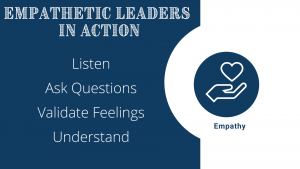
TL;DR:
- An empathetic leader breaks down walls, deepens relationships, and inspires others.
- They promote collaboration and help others feel valued.
- Empathetic leaders listen and create opportunities for others to share.
The conversation about empathy is trending. In the last decade, #GoogleTrends indicates that interest in empathy has grown more than 75%. The world is discovering that empathy is a power source. It fuels our emotional energy. It is a critical skill that sets leaders apart. Titles don’t make leaders, being empathetic does. Being an empathetic leader doesn’t simply mean being kind or nice.
As I discussed in my first #TeachEmpathy blog series post, empathy is much more complex, challenging, and deeper than that. Being empathetic challenges our assumptions. Empathy requires you to look through the window into someone else’s perspective and feelings.
The world is discovering that empathy is a power source. It fuels our emotional energy. It is a critical skill that sets leaders apart. Titles don’t make leaders, being empathetic does. Click To TweetEmpathy in Action

The benefits of empathy are endless. An empathetic leader breaks down walls. An empathetic leader deepens relationships. They inspire others. They promote collaboration. And they understand the hidden stories. And they help others feel valued.
But how does it work? How do leaders actually practice empathy?
Empathetic Leaders Listen
Empathetic leaders listen for understanding, not to respond. They listen for tone of voice, intensity, and pace. Empathetic listening requires listening with your body, leaning into the conversation, and making eye contact.
Empathetic Leaders Ask Questions
Open-ended questions are an invitation to more conversation. Empathetic leaders create opportunities to share in a safe space without judgment. Below are some great examples to try.
- What is your desired outcome?
- How is this affecting you?
- What did we learn?
- What is keeping you from succeeding?
- Is there anything I can do?
Empathetic Leaders Validate Feelings
Emotional validation is the process of learning and understanding another’s perspective and being supportive of their feelings. Most importantly, it is expressing acceptance of another person’s emotions. Validation does not mean agreeing or even approving.
Validating statements:
- Thank you for sharing that with me.
- It is ok to feel that way.
- I understand how the situation made you feel like that.
- I see it is hurting you.
- I’m here with you.
Invalidating statements:
- It could be worse.
- You’ll be fine.
- It’s not a big deal.
- Don’t be so sensitive.
- It is a waste of time worrying about this.

Empathetic Leaders Understand
As George Bernard Shaw said, “Do not do unto others as you would have them do unto you – they might have different tastes.” Empathetic leaders seek to understand the ‘different tastes’ among everyone.
Please click here to connect more…I would love to hear your feedback, questions, and how you lead with empathy!
About Sari Goldberg McKeown
Sari Goldberg McKeown is a lifelong learner. She believes education is about who we teach, not just about what we teach. Sari is passionate about culture, relationships, and learning from each other. She believes in the power of being a connected educator. As educators, we are better together! Sari has served as an educator in many K-12 roles for over fifteen years, including classroom teacher, literacy specialist, mentor, supervisor, and coordinator. Currently, Sari serves as a central office administrator and remote learning principal on Long Island, New York.
She is the co-founder and co-moderator of the #Read2Lead Twitter chat and Voxer group, co-founder of #UnitedWeLearn, and series contributor on the #MentorRoundTable webinar series. She is also honored to be a part of the EdCamp Long Island planning team. Currently, Sari is a doctoral student in the Ed.D. Educational Administration and Supervision program at St. John’s University. Sari is a proud wife to third grade teacher, Bob, and bonus mom to three amazing children.



